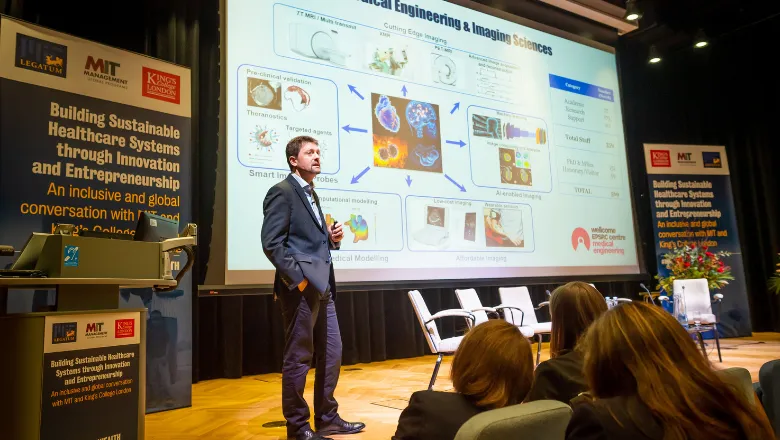We aim to create an infrastructure that will support clinical and commercial translation, digital health technologies including AI, medical devices, workforce and process improvements that will be of global significance.
Professor Sebastien Ourselin, Head of the School of Biomedical Engineering & Imaging Sciences
24 May 2019
Joint summit shines spotlight on innovation and entrepreneurship in healthcare
King’s and MIT joined forces to find new ways of building sustainable healthcare systems through innovation and entrepreneurship.

King’s and MIT welcomed entrepreneurs, academics, healthcare professionals and policy makers from around the world in an all-day summit at Bush House. The summit set out to explore what role innovators and entrepreneurs can play in overcoming global health challenges and create a safer, healthier, more prosperous world.
The goal was to discuss new ways to use innovation and entrepreneurship to enable improved sustainability, accessibility and quality in healthcare, while supporting and shaping the environment needed to maximise impact.
To achieve this goal, Professor Sebastien Ourselin, Head of the School of Biomedical Engineering & Imaging Sciences at King’s, reaffirmed that optimising patient benefits must be at the heart of any health research. This principle is the foundation to crafting a ‘fit for purpose’ ecosystem for healthcare innovation.
Professor Ourselin highlighted the new £10 million AI Centre at St Thomas’ Hospital, which will champion value-based healthcare in the UK. He stressed that translating innovative technologies into the NHS is complex, requiring multidisciplinary teams including clinicians, engineers, computer scientists, applied physicists, industry and regulatory advisers.
How artificial intelligence can transform global healthcare
With the incredible improvements in healthcare showing no sign of slowing down, artificial intelligence is more important than ever.
Dr Jorge Cardoso, Senior Lecturer in Artificial Medical Intelligence at King’s, argued that current healthcare systems are unoptimised and discussed how artificial intelligence and machine learning can repurpose and redesign them – revolutionising healthcare in emerging economies.
The benefits of this technology are wide-ranging, saving doctors time and allowing them to focus on the things that matter most. Artificial intelligence enables us to find previously unseen patterns to deliver better and more personalised care, as well as automate expensive tasks to reduce costs.
Clinicians and hospital staff should not be wasting their time with menial tasks that are better done by algorithms; they should be making decisions, interacting with patients, and bringing humanity back into healthcare.
Dr Jorge Cardoso, Senior Lecturer in Artificial Medical Intelligence
Dr Cardoso stated artificial intelligence is a key component in optimising healthcare systems. This process requires collecting, harmonising, curating and extracting meaning from data. It is usually very time consuming and slow without AI algorithms and appropriate infrastructure. He affirmed: “If we want decisions to be made in an evidence-based and timely manner, we need systems that are as automated and intelligent as possible.”
Making healthcare more accessible worldwide
Accessibility and affordability in healthcare are two common priorities for policy makers in this field. And one way to ensure people get the care they need close to home is through frugal health initiatives.
Over the past decade, Professor Prashant Jha, Head of Affordable Medical Technologies at the School of Biomedical Engineering & Imaging Sciences, focused on creating innovative and affordable medical devices – lowering costs and making them more accessible for patients. Professor Jha’s devices are aimed at “improving care for the many, not the few.”
At the conference, Professor Jha shared his model of training and how he has used frugal thinking to “remove zeroes from the price of multiple medical devices.” Between 2013 to 2018, his team have created 7 devices, 13 patents, 5 start-ups, trained more than 150 innovators and touched more than 1 million lives.
Despite these impressive numbers, Professor Jha claimed “people are my real products” and that “healthcare shouldn’t be run for shareholders; it should be run for the people.”
With the NHS facing its own research constraints, Professor Jha argued the UK should be looking to learn more from India’s expertise in affordable innovation. Some of those frugal innovation principles are now taught and applied at King’s to help UK’s hospitals save money and provide better care.
Professor Jha also emphasised the importance of discovery and teaching our future generation of medical professionals outside of the classroom.
When you send students to the frontline, a clinic or nursing home, they develop sympathy – the most powerful thing a human can experience.
Professor Prashant Jha, Head of Affordable Medical Technologies at the School of Biomedical Engineering & Imaging Sciences
